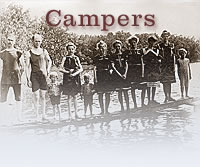       

|
 |

Campers: David Lott Strickler
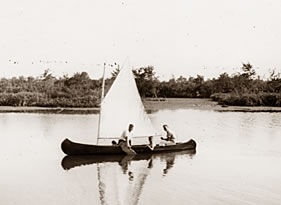 One
day my father brought home a battered old canoe. From a design
in a Boy Scout magazine I built a sail rig and installed it
on the canoe, became Captain Bligh and sailed to every corner
of Buckeye Lake. Eventually I installed a second sail and now
I had a schooner. It was only a matter of time before I decked
the canoe over and installed a rudder. I controlled the rudder
with a wheel mounted on the thwart holding the two lee boards
and kept the whole contraption upright in mild winds by squatting
in the bottom, holding one sheet line in one hand, the other
in my teeth. I used the other hand to steer. In many years of
sailing that rig, I capsized but once. One
day my father brought home a battered old canoe. From a design
in a Boy Scout magazine I built a sail rig and installed it
on the canoe, became Captain Bligh and sailed to every corner
of Buckeye Lake. Eventually I installed a second sail and now
I had a schooner. It was only a matter of time before I decked
the canoe over and installed a rudder. I controlled the rudder
with a wheel mounted on the thwart holding the two lee boards
and kept the whole contraption upright in mild winds by squatting
in the bottom, holding one sheet line in one hand, the other
in my teeth. I used the other hand to steer. In many years of
sailing that rig, I capsized but once.
David L. Strickler
|
| |
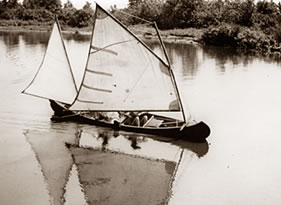 In
strong winds I kept upright by perching on the windward gunwale,
bracing one foot under the opposite, steering the boat with
the other bare foot and controlling the sheet lines one in each
hand. Being so close to the water gave the impression of going
ninety miles an hour. Lord, how I loved it! It gave my mother
nervous prostration, but she bore it bravely. I was a thorn
in the yacht club racing fleet's bilge; I so enjoyed getting
in their way. As a mature man I owned sailboats that were fine
craft. they wre sources of pride; they gave me, as well as my
family, great pleasure. But none ever gave me the fun the old
sailing canoe rendered. In
strong winds I kept upright by perching on the windward gunwale,
bracing one foot under the opposite, steering the boat with
the other bare foot and controlling the sheet lines one in each
hand. Being so close to the water gave the impression of going
ninety miles an hour. Lord, how I loved it! It gave my mother
nervous prostration, but she bore it bravely. I was a thorn
in the yacht club racing fleet's bilge; I so enjoyed getting
in their way. As a mature man I owned sailboats that were fine
craft. they wre sources of pride; they gave me, as well as my
family, great pleasure. But none ever gave me the fun the old
sailing canoe rendered.
David L. Strickler
|
| |
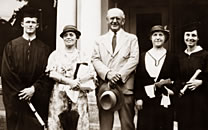 As
people grow older the maturity gap narrows. This began to happen
after my sophomore year in college and I had to decide what
my major would be. Though my father hoped I'd become an engineer,
I was less enthusiastic about it. I had kept alive my interest
in singing by singing in college groups. And so one day we discussed
my station in life and the decision I was struggling to make.
Bless him, it was he who sprung open the lock. "Well, you
like your music. Why not make that your life's work." I
know he felt an engineering career would have put more dollars
in the kitty, but there were other things, among them happiness,
that mattered. As
people grow older the maturity gap narrows. This began to happen
after my sophomore year in college and I had to decide what
my major would be. Though my father hoped I'd become an engineer,
I was less enthusiastic about it. I had kept alive my interest
in singing by singing in college groups. And so one day we discussed
my station in life and the decision I was struggling to make.
Bless him, it was he who sprung open the lock. "Well, you
like your music. Why not make that your life's work." I
know he felt an engineering career would have put more dollars
in the kitty, but there were other things, among them happiness,
that mattered.
David L. Strickler
|
| |
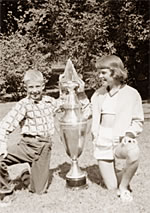 Labor
Day, 1953, the year-ending regatta. We start first with the
slow boats. Later will come the fast boys - the Stars, Lightnings,
and 110s. A good start. We take the lead and hold it. But soon,
the others will come. Where are they? The downwind leg. An anxious
glance behind us. The others are trapped by a wind shift. "Stand
up and hold your rain coats out so the wind will catch them.
Stay calm now!" the knee-trembling skipper admonishes.
We finish fifteen minutes ahead of the fleet, and for the next
year a trophy as large and ugly as the America's Cup gathers
dust in the corner of our living room. it's the most beautiful
trophy in the world. Labor
Day, 1953, the year-ending regatta. We start first with the
slow boats. Later will come the fast boys - the Stars, Lightnings,
and 110s. A good start. We take the lead and hold it. But soon,
the others will come. Where are they? The downwind leg. An anxious
glance behind us. The others are trapped by a wind shift. "Stand
up and hold your rain coats out so the wind will catch them.
Stay calm now!" the knee-trembling skipper admonishes.
We finish fifteen minutes ahead of the fleet, and for the next
year a trophy as large and ugly as the America's Cup gathers
dust in the corner of our living room. it's the most beautiful
trophy in the world.
John D. Strickler |
|
|